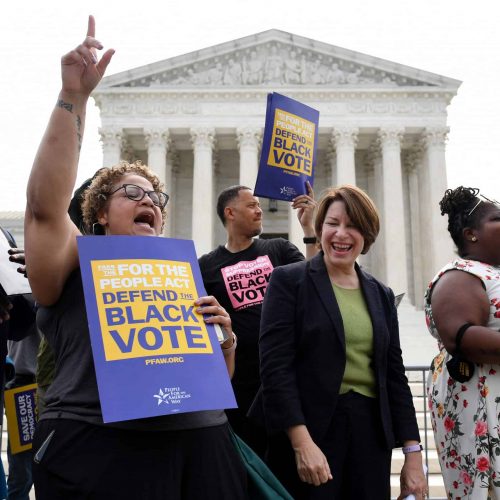Introduction
Congress faces growing pressure to pass new federal voting legislation in the wake of a Supreme Court decision last week that will make it more difficult to challenge a spate of new Republican-backed state-level voting restrictions.
Democrats already wrestling with a loaded agenda on voting rights now face the additional complication of how to address the ruling, beyond a slew of strongly worded statements.
Congressional leaders say legislation to expand ballot access is their top priority in the aftermath of the 2020 election, but they have struggled to advance it. Last month, a sweeping package that would have set a new national baseline for election laws while overhauling campaign finance and government ethics provisions ran into a solid wall of Republican opposition in the closely divided Senate.
Democrats are also working on a separate bill, the John Lewis Voting Rights Advancement Act, that would respond to a 2013 Supreme Court decision invalidating a key part of the landmark 1965 Voting Rights Act.
Asked whether Congress should also respond legislatively to the latest ruling from the court, U.S. Rep. G.K. Butterfield, a North Carolina Democrat who heads the House Administration Committee’s elections subcommittee, said discussions are underway this week. “I can’t speak for my leadership, but I would hope so,” he said.
“We need to say to the courts and to jurisdictions that if you’re going to change the law, you have to ensure it has no disparate impact on minority voters,” he said. “Not a little, but no disparate impact on minority voters.”
Butterfield’s subcommittee recently completed a series of hearings to build a legislative record to support the John Lewis act, named for the late civil rights leader and member of the U.S. House of Representatives. The legislation would enact a new version of the requirements the Supreme Court struck down in 2013.
Butterfield, a civil rights lawyer before his election to Congress, said his subcommittee expects to send thousands of pages compiled from the hearings to the House Judiciary Committee this week. That committee is close to finishing its own hearings on voting rights, designed to assemble the evidence of continuing discrimination that members and voting rights experts believe is necessary for the measure to survive if challenged in court after passage.
Butterfield said that record will allow him, together with other key members of the House, to work during Congress’s August recess on a new formula establishing which states and jurisdictions will be required to preclear voting changes with the U.S. Department of Justice. The goal, he said, is for the House to vote on the bill in September.
Like Democrats’ earlier bill, known as the For the People Act, the Lewis legislation faces an uncertain future in the U.S. Senate. There, it would require the support of all 48 Democratic senators, the two independents who caucus with them, and at least 10 Republicans in order to break a filibuster. U.S. Sen. Lisa Murkowski of Alaska, a Republican, has co-sponsored previous iterations of the John Lewis act and is considered likely to do so again. Butterfield said he still believes it’s possible for negotiations to produce a bill that a sufficient number of Republican senators could support.
In addition, some voting rights experts have said any legislation must add provisions to counteract state-level Republican efforts to increase partisan control over election administration, which could create the potential for election subversion.
Colorado Secretary of State Jena Griswold said that in several states, Republican candidates for the top elections job in 2022 have been involved in promoting untruths about the 2020 election.
“Every American should be calling on the federal government to pass reforms to protect the right to vote,” said Griswold, who chairs the Democratic Association of Secretaries of State. “But also they should be paying attention to who will serve as the chief election officer in their state.”
Many Democrats are also continuing to push for passage of the For the People Act, which Republicans have said is a partisan proposal in its current form. “There’s really nothing we can say to the voters next year if we don’t get this fundamental democracy reform legislation passed and enacted into law,” said Rep. John Sarbanes, D-Maryland, who sponsored the bill in the U.S. House.
The Senate Rules Committee will hold hearings, including one later this month in Georgia, on “the urgent need to pass critical voting, campaign finance, and ethics reforms,” U.S. Sen. Amy Klobuchar, D-Minn., the committee’s chairwoman, said in an emailed statement. She called last week’s ruling “yet another affront to Americans’ constitutional right to pick their elected officials.”
Voting rights advocates and many Democratic lawmakers have pressed Democratic senators to eliminate the filibuster, which would allow legislators to pass bills with a simple majority. “It’s extremely unfortunate, but I think it’s become increasingly clear that Democrats may have to go it alone,” said Aaron Scherb, director of legislative affairs for the nonpartisan Common Cause, a nonprofit group that has advocated for both the For the People Act and the legislation named for Lewis.
But at least two Democratic senators have said they will not vote to eliminate the filibuster. One, U.S. Sen. Joe Manchin of West Virginia, has said voting legislation should be bipartisan and proposed a compromise package.
The initial Republican response? Rejection.
Carrie Levine is a senior reporter at the Center for Public Integrity. She can be reached at clevine@publicintegrity.org. Follow her on Twitter @levinecarrie.
Read more in Inside Public Integrity
Watchdog newsletter
The U.N. says it’s torture. Judges ruled this school can use shock therapy anyway.
Electric shocks are a rare form of school discipline meted out to students with disabilities. Restraint is far more common. Both draw objections.
Watchdog newsletter
The Supreme Court’s subtle hint on police accountability
Recent rulings suggest the high court may be open to ‘recalibrating’ qualified immunity.




Join the conversation
Show Comments